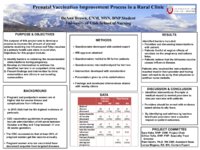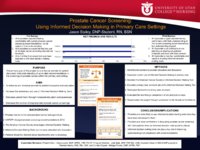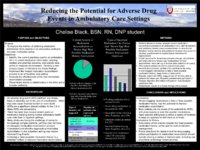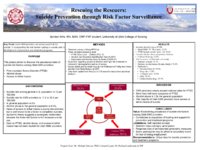The Graduate Nursing Project collection includes Doctor of Nursing Practice (DNP) Scholarly Projects and Master's students' non-thesis projects submitted as part of program requirements.
TO
- Graduate Nursing Project, Doctor of Nursing Practice, DNP130
- Graduate Nursing Project, Doctor of Nursing Practice, DNP, Poster11
- Graduate Nursing Project, Doctor of Nursing Practice, DNP, Primary Care / FNP, Poster9
- Graduate Nursing Project, Doctor of Nursing Practice, DNP, Acute Care, Poster4
- Graduate Nursing Project, Doctor of Nursing Practice, DNP, MS to DNP, Poster3
- More
Filters: Collection: ehsl_gradnu
| Title | Description | Creator | Subject | ||
|---|---|---|---|---|---|
| 126 |
 |
Pain Assessment in Older Adults with Cognitive Dysfunction | This project examined the utility of an educational module to increase the knowledge and understanding of the application of current clinical guidelines by a health care team (HCT) in the assessment of pain in older adults with cognitive dysfunction. Twelve members of the HCT in a local memory care ... | Gilbert, Karen A. | Advanced Practice Nursing; Education, Nursing, Graduate; Pain Threshold; Pain Measurement; Chronic Pain; Pain Perception; Pain Management; Aged; Cognitive Dysfunction; Comorbidity; Observational Studies as Topic; Quality of Life |
| 127 |
 |
Point-of-Care Ultrasound for Central and Peripheral Line Procedures in Neonates | An educational module on point-of-care ultrasound for central line procedures in neonates was developed for this DNP scholarly project. Point-of-care ultrasound for central line procedures is currently underutilized in the neonatal population. Most critically ill neonates require central line access... | Jenkins, Alysha | Advanced Practice Nursing; Education, Nursing, Graduate; Systems Analysis; Infant, Newborn; Point-of-Care Systems; Intensive Care, Neonatal; Ultrasonography; Catheterization, Peripheral; Catheterization, Central Venous |
| 128 |
 |
Point-of-Care Ultrasound for Central Line Procedures in Neonates | POSTER | Jenkins, Alysha | Advanced Practice Nursing; Education, Nursing, Graduate; Clinical Competence; Infant, Newborn; Point-of-Care Systems; Intensive Care, Neonatal; Ultrasonography; Catheterization, Peripheral; Catheterization, Central Venous; Poster |
| 129 |
 |
Pre-Procedural Fasting Guideline for an Intensive Care Unit | Procedures performed at the bedside such as bronchoscopy or transesophogeal echocardiogram (TEE) are common in the intensive care unit (ICU). These procedures, among others, require a prior period of fasting. Currently, common practice is to order "nil per os (NPO) at midnight", similar to practice ... | Bartlett, Robert D. | Advanced Practice Nursing; Education, Nursing, Graduate; Fasting; Intensive Care Units; Clinical Protocols; Enteral Nutrition; Nutritional Support; Infant Nutrition Disorders; Respiratory Aspiration; Pneumonia, Aspiration; Perioperative Care; Treatment Outcome; Practice Guidelines as Topic |
| 130 |
 |
Pre-Procedural Fasting Guideline for the Intensive Care Unit | POSTER | Bartlett, Robert D. | Advanced Practice Nursing; Education, Nursing, Graduate; Fasting; Intensive Care Units; Clinical Protocols; Enteral Nutrition; Nutritional Support; Infant Nutrition Disorders; Respiratory Aspiration; Pneumonia, Aspiration; Perioperative Care; Treatment Outcome; Practice Guidelines as Topic; Poster |
| 131 |
 |
Prediabetes Screening in the Emergency Room | POSTER | Aloia, Andrew | Advanced Practice Nursing; Education, Nursing, Graduate; Prediabetic State; Diagnostic Screening Programs; Risk Factors; Diabetes Mellitus; Health Services Accessibility; Emergency Treatment; Emergency Nursing; Emergency Service, Hospital; Primary Care Nursing; Practice Guidelines as Topic; Poster |
| 132 |
 |
Prediabetes Screening in the Emergency Room | Diabetes continues to be a leading cause of morbidity and mortality and contributes substantially to healthcare costs. Prediabetes indicates a future risk for diabetes. Consequently prediabetes screening is paramount in combating our country's diabetes problem. The Centers for Disease Control and Pr... | Aloia, Andrew | Advanced Practice Nursing; Education, Nursing, Graduate; Prediabetic State; Diagnostic Screening Programs; Risk Factors; Diabetes Mellitus; Health Services Accessibility; Emergency Treatment; Emergency Nursing; Emergency Service, Hospital; Primary Care Nursing; Practice Guidelines as Topic |
| 133 |
 |
Prenatal Care for the Family Nurse Practitioner | POSTER | Karr, Jennifer | Advanced Practice Nursing; Education, Nursing, Graduate; Systems Analysis; Prenatal Care; Primary Health Care; Family Nurse Practitioners; Health Knowledge, Attitudes, Practice; Clinical Competence; Certification; Licensure; Evidence-Based Practice; Education, Distance; Quality of Health Care; Mater... |
| 134 |
 |
Prenatal Vaccination Improvement Process in a Rural Clinic | POSTER | Brown, DeAnn | Advanced Practice Nursing; Education, Nursing, Graduate; Pregnant Women; Prenatal Care; Patient Education as Topic; Immunization Programs; Rural Health; Rural Health Services; Primary Health Care; Treatment Outcome; Quality Improvement; Poster |
| 135 |
 |
Prenatal Vaccination Improvement Process in a Rural Clinic | Pregnant women and infants are at increased risk of complications from influenza and pertussis disease yet vaccine rates for these illnesses are historically low. Many barriers exist that prevent some high-risk groups from obtaining immunizations. By utilizing proven strategies and creative solution... | Brown, DeAnn | Advanced Practice Nursing; Education, Nursing, Graduate; Rural Health Services; Prenatal Care; Pregnant Women; Pregnancy Complications; Immunization Programs; Influenza Vaccines; Pertussis Vaccine; Healthy People Programs; Social Determinants of Health; Quality Improvement |
| 136 |
 |
Prescribing Practices of Oral Anti-Reflux Medications in the Neonatal Population | POSTER | Worman, Catherine | Advanced Practice Nursing; Education, Nursing, Graduate; Gastroesophageal Reflux; Proton Pump Inhibitors; Receptors, Histamine H2; Histamine Agonists; Drug Therapy; Overtreatment; Intensive Care, Neonatal; Patient Safety; Omeprazole; Ranitidine; Practice Guidelines as Topic; Treatment Outcome; Quali... |
| 137 |
 |
Prevalence of Suicide Risk Factors among Emergency Medical Services Providers in Utah | Emergency Medical Services (EMS) providers suffer a higher rate of suicide than the general population. National statistics show an age adjusted rate of 13.0 suicides per 100,000 in the general population. However, EMS providers have been shown to have suicide rates of 17.2 to 30.5 suicides per 100,... | Mills, Gordon | Advanced Practice Nursing; Education, Nursing, Graduate; Emergency Medical Technicians; Suicidal Ideation; Suicide; Prevalence; Risk Factors; Stress, Psychological; Stress Disorders, Post-Traumatic; Alcoholism; Social Support; Stakeholder Participation; Mental Disorders; Preventive Health Services; ... |
| 138 |
 |
Preventing HIV in Primary Care: Preexposure Prophylaxis | Description: The purpose of this project was to create a continuing online education module to improve primary care provider knowledge in prescribing the preexposure prophylaxis (PrEP) medication emtricitabine-tenofovir (FTC-TDF) in high-risk men who have sex with men. Problem Statement: In 2012, th... | Howland, Philip M. | Advanced Practice Nursing; Education, Nursing, Graduate; Unsafe Sex; Attitude to Health; HIV Infections; Pre-Exposure Prophylaxis; Primary Health Care; Primary Prevention; Health Behavior; Preventive Health Services; Emtricitabine, Tenofovir Disoproxil Fumarate Drug Combination; Anti-HIV Agents;... |
| 139 |
 |
Professional Liability Section Survey | POSTER | Cardeña, Melissa House | Advanced Practice Nursing; Education, Nursing, Graduate; Nurse Midwives; Midwifery; Licensure, Nursing; Professional Practice; Liability, Legal; Insurance, Liability; Standard of Care; Surveys and Questionnaires; Poster |
| 140 |
 |
Professional Liability Section Survey | Certified Nurse Midwives (CNMs) and Certified Midwives (CMs) face litigation and liability in their clinical practice. The Professional Liability Section (PLS) of the American College of Nurse Midwives (ACNM) has conducted surveys in the past to understand the issues surrounding litigation in CNM an... | Cardeña, Melissa House | Advanced Practice Nursing; Education, Nursing, Graduate; Nurse Midwives; Midwifery; Licensure, Nursing; Professional Practice; Liability, Legal; Insurance, Liability; Standard of Care; Surveys and Questionnaires |
| 141 |
 |
Promoting Comprehensive Sexuality Education to Adolescents through Primary Care | Young people in the United States continue to engage in risky sexual behaviors that result in negative health outcomes. Sources of sexuality education include reliable sources (parents, teachers, and primary care providers [PCPs]) and unreliable sources (media and peers). Parents face communication ... | Nelson, Niesha | Advanced Practice Nursing; Education, Nursing, Graduate; Systems Analysis; Unsafe Sex; Sex Education; Adolescent; Adolescent Health; Parent-Child Relations; Risk Reduction Behavior; Sexuality; Pregnancy, Unwanted; Health Education; Primary Health Care; Sexually Transmitted Diseases; Treatment Outcom... |
| 142 |
 |
Prostate Cancer Screening: Using Informed Decision Making in Primary Care Settings | Since 2012, multiple new guidelines have been issued advising changes in screening for prostate cancer (PC). New guidelines suggest limiting the frequency of prostate cancer screening, although prostate cancer is now the most prevalent form of cancer in males 30 years and older in the United States ... | Staley, Jason | Advanced Practice Nursing; Education, Nursing, Graduate; Prostatic Neoplasms; Early Detection of Cancer; Prostate-Specific Antigen; Guidelines as Topic; Patient Education as Topic; Primary Prevention; Clinical Decision-Making; Diagnostic Screening Programs; Health Knowledge, Attitudes, Practice; Att... |
| 143 |
 |
Prostate Cancer Screening: Using Informed Decision Making in Primary Care Settings | POSTER | Staley, Jason | Advanced Practice Nursing; Education, Nursing, Graduate; Prostatic Neoplasms; Early Detection of Cancer; Prostate-Specific Antigen; Guidelines as Topic; Patient Education as Topic; Primary Prevention; Clinical Decision-Making; Diagnostic Screening Programs; Health Knowledge, Attitudes, Practice; Att... |
| 144 |
 |
PTSD Veterans Simulation Training | POSTER | Angell, Charleen | Advanced Practice Nursing; Education, Nursing, Graduate; Stress Disorders, Post-Traumatic; United States Department of Defense; United States Department of Veterans Affairs; Hospitals, Veterans; Practice Guidelines as Topic; Evidence-Based Practice; Nurse Practitioners; Psychiatric Nursing; Mental H... |
| 145 |
 |
Reducing the Potential for Adverse Drug Events in Ambulatory Care Settings | POSTER | Black, Chelise | Advanced Practice Nursing; Education, Nursing, Graduate; Drug-Related Side Effects and Adverse Reactions; Drug Interactions; Ambulatory Care Facilities; Health Literacy; Drug Interaction; Drug Overdose; Electronic Health Records; Polypharmacy; Outpatients; Medication Adherence; Medication Adherence;... |
| 146 |
 |
Reducing the Potential for Adverse Drug Events in Ambulatory Care Settings | Adverse Drug Events (ADEs) are a significant clinical problem in the United States; many are preventable if a provider has full knowledge of patients' medications. The process of gathering medication information is known as medication reconciliation. There is currently an inadequate focus on medicat... | Black, Chelise | Advanced Practice Nursing; Education, Nursing, Graduate; Drug-Related Side Effects and Adverse Reactions; Drug Interactions; Ambulatory Care Facilities; Health Literacy; Drug Interaction; Drug Overdose; Electronic Health Records; Polypharmacy; Outpatients; Medication Adherence; Medication Adherence;... |
| 147 |
 |
Rescuing the Rescuers: Suicide Prevention through Risk Factor Surveillance | POSTER | Mills, Gordon | Advanced Practice Nursing; Education, Nursing, Graduate; Suicidal Ideation; Suicide; Prevalence; Risk Factors; Emergency Medical Technicians; Stress, Psychological; Stress Disorders, Post-Traumatic; Alcoholism; Social Support; Surveys and Questionnaires; Utah; Poster |
| 148 |
 |
Research Dissemination by Posters and Journal Clubs | Research becomes useful when findings are disseminated to providers and then translated into action. Reviews of the medical field in the 1990s found that research alone did not lead to desired patient outcomes because patient outcomes only improved as providers translated research into clinically re... | Stuart, Benjamin | Advanced Practice Nursing; Education, Nursing, Graduate; Reading; Information Dissemination; Nurse Practitioners; Evidence-Based Nursing; Practice Guidelines as Topic; Posters as Topic; Evaluation Studies as Topic; Databases, Bibliographic; Peer Review |
| 149 |
 |
Screening for Intimate Partner Violence in a Primary Care Setting | Intimate partner violence (IPV) leads to serious health complications for women and has become a public health crisis across the US. The US Preventive Services Task Force (USPSTF) recommends that clinicians screen all women of childbearing age for IPV, such as domestic violence (DV), and to provide ... | Bywater, Kelsey | Advanced Practice Nursing; Education, Nursing, Graduate; Intimate Partner Violence; Domestic Violence; Diagnostic Screening Programs; Evidence-Based Practice; Social Problems; Women's Health Services; Primary Care Nursing; Primary Health Care; Health Care Coalitions |
| 150 |
 |
Screening for Intimate Partner Violence in Emergency Departments | Throughout the nation, Emergency departments (EDs) and primary care clinics identify twice as many intimate partner violence victims through routine screening as compared to other healthcare settings that do not routinely screen. The healthcare staffs' compliance to screening is essential to help re... | Burt, Erin | Advanced Practice Nursing; Education, Nursing, Graduate; Intimate Partner Violence; Spouse Abuse; Human Rights; Diagnostic Screening Programs; Social Problems; Communication Barriers; Emergency Service, Hospital; Patient Safety; Inservice Training; Clinical Protocols; Crisis Intervention; Benchmark... |
